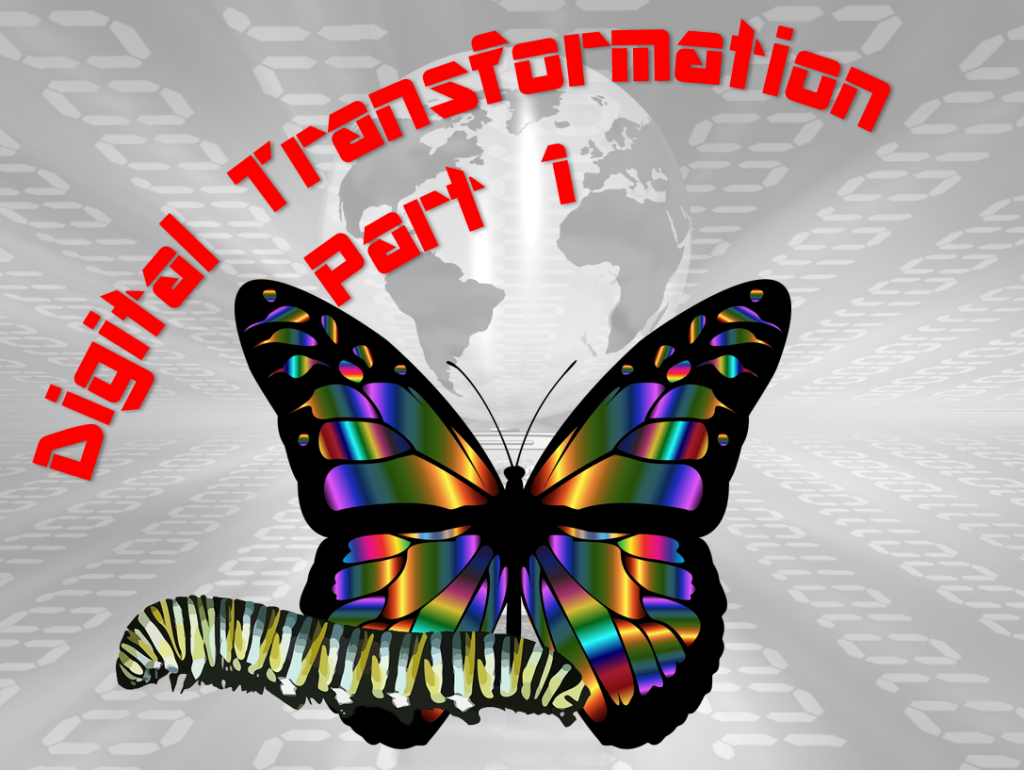“The race is on to transform today’s enterprise to a digital entity,” writes Arthur Cole (@acole602), “which sounds like a reasonable goal until you stop to consider that no one knows exactly what a digital enterprise is.”[1] He raises a real business conundrum — how can transforming to into a digital enterprise be an imperative when pundits aren’t exactly sure what that means? Bridget Butler Millsaps (@Bridgetmillsaps) agrees with Cole that figuring out exactly what it means to become a digital enterprise is the first step in the journey. “No matter the system in your business, whether you are still hand-writing receipts for your customers and drowning in a constant sea of paper on your desk or already completely paperless, wireless, and everything streamlined,” she writes, “more changes are ahead as we become immersed in the digital age — and that’s going to mean a lot of work for consultants as so many business owners seem to have big question marks looming over their heads regarding the topic.”[2] She continues:
“In a recent Digital Transformation Survey by IFS Research, it would appear that around the globe, the majority of businesses are aware they will need to undergo a digital transformation, but some are still in the dark as to how to plan for such a thing. And some (perhaps hopefully) just think it’s a buzzword that might fade off into the distance eventually, forgotten.”
I can assure you “digital transformation” is not a buzzword. And the IFS Research study cited by Millsaps revealed a significant majority of business executives understand digital transformation is an imperative. According to the study, “86% of the respondents say digital transformation will play a key role in their market in the coming five years.” On the other hand, the study confirms Cole’s assertion that business executives aren’t exactly sure what digital transformation means. “76% [of respondents] answered that they need more information about digital transformation.” My advice to harried business executives spun up about digital enterprise transformation is to relax. The reason pundits don’t know exactly what digital transformation means is because it means something different for each business. Little wonder that the IFC Research study found, “Many companies have not come … far when it comes to implementing strategies: 40% of the respondents answered they don´t have a clear strategy for digital transformation.”
Tom Goodwin (@tomfgoodwin) asserts companies need a genuine commitment to digital enterprise transformation. They need to jump in with both feet and not just dip a toe to test the water. He insists, “Virtually all companies are doing digital transformation wrong. We’re placing it around the edge, keeping it at arm’s length, like it’s a problem and not an opportunity.”[3] He adds:
“If companies are to succeed, we need to rebuild around what’s possible, with the greatest toolkit we’ve ever seen. We talk a lot about the vast changes technology has had on our lives and on business. We celebrate the huge shifts that have happened. We can now book flights from apps, pay for taxis with our phones and buy things in-store from shop-hosted tablets. We celebrate what we’ve done and what’s changed, not what was actually possible or what changes have yet to happen. I believe we should be collectively disappointed at our inaction — it’s time we thought harder, took greater risks and embraced a new world.”
One of the primary tools in the kit referred to by Goodwin is cognitive computing. I define cognitive computing as the combination of Semantic Intelligence (which includes natural language processing, artificial intelligence, and machine learning) and Computational Intelligence (i.e., advanced mathematics). I predict that cognitive computing will be at the heart of most digital enterprises in the decades ahead. Why? Because cognitive computing capabilities can be applied to almost every aspect of a business — regardless of the economic sector in which that business operates. Cognitive computing systems can gather, integrate, and analyze both structured and unstructured data. That data can be shared throughout the enterprise helping to break down information silos and aligning corporate divisions. Cognitive computing systems can discover new relationships and provide actionable insights to decision makers. Cognitive computer systems can be programmed to make routine decisions and alert human decision makers when an anomaly requires their attention. Cognitive computing systems also learn as they work — meaning over time they get better at making decisions. They can also be programmed to automate routine processes freeing employees to deal with more demanding challenges. The Enterra Solutions® entry in this field is the Enterra Enterprise Cognitive System™ (ECS) — a system that can Sense, Think, Act, and Learn®.
Spandus Lui (@spandaslui) reports, “The reason why organisations fail to take full advantage of technology to transform their businesses is simply because they don’t have a clear direction on how to do so.” [4] Technology won’t help you reimagine your business; it can only help you achieve goals you’ve already set. Reimagining your business model in light of the digital revolution is no easy matter. Get it wrong and you could be out of business. Lui writes, “Forrester’s definition of a digital enterprise is clear: it’s a business that doesn’t just think that adding in new systems and applications equates to a digital transformation. It’s a business that re-evaluates just how it should operate based on new digital technologies to bring new value to itself and its customers.” Technologies are being developed at a rapid pace and companies without a clear transformation strategy companies could find themselves in a technology tail chase. That is not a formula for success. Sue Marquette Poremba (@sueporemba) observes, “Data is the driving force for the way we work, play, and interact with each other, so much so that it has led one writer to call this age of digital disruption and innovation our era’s version of the Industrial Revolution, adding that we are living in what may be the ‘most transformable’ period in all of history. This digital disruption is changing how we do just about everything.”[5]
In the second part of this article, I’ll discuss some suggestions that have been proffered to help companies successfully transform themselves into digital enterprises.
Footnotes
[1] Arthur Cole, “Transitioning to a Digital Enterprise,” IT Business Edge, 29 June 2016.
[2] Bridget Butler Millsaps, “Is Your Business Ready for the Impending Digital Transformation? Many Surveyed Say No.” 3DPrint.com, 17 July 2016.
[3] Tom Goodwin, “We’re at peak complexity — and it sucks,” TechCrunch, 3 September 2016.
[4] Spandus Lui, “What Does It Mean To Be A Digital Enterprise?” Lifehacker, 2 September 2016.
[5] Sue Marquette Poremba, “The Digital Disruption Revolution,” IT Business Edge, 29 August 2016.





